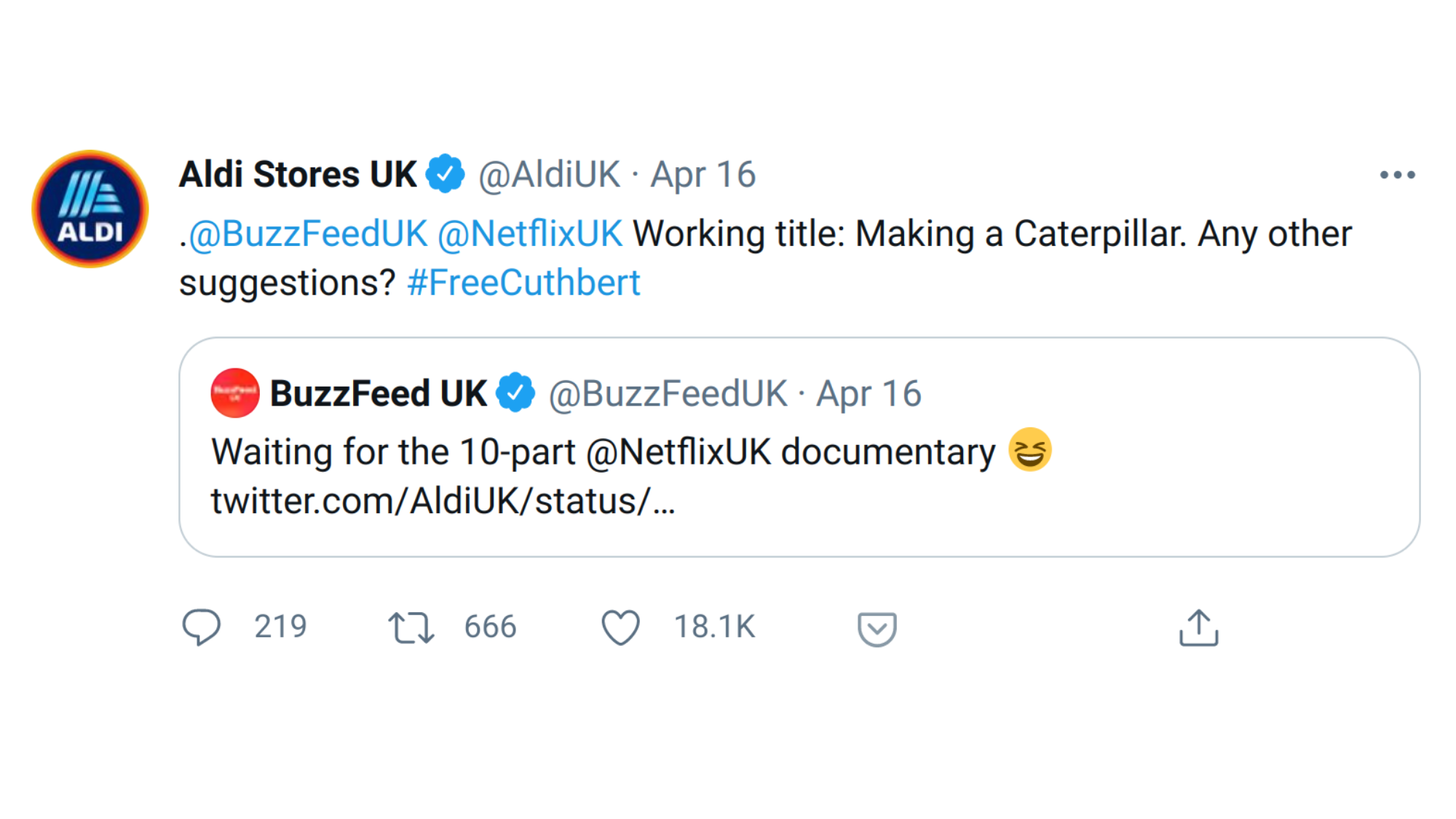Marks & Spencer asked Aldi to agree not to sell anything similar, but Aldi pulled out another cheeky one-liner to amuse social media fans. “We’re bringing back a limited-edition Cuthbert next month and want to donate all profits to cancer charities including your partners Macmillan Cancer Support and ours Teenage Cancer Trust”, they said.
M&S’s social media team were quick to respond, saying: “we love a charity idea (Colin’s been a BIG fundraiser for years). We just want you to use your own character.”
It’s all about character
Aldi’s loyal fan base wasn’t impressed by their attempt to introduce a little wit. I’m not saying I support Aldi’s approach, but I understand why M&S’s witty posts didn’t go down as well as their cake – it was out of character.
To put this into perspective, let’s imagine HMRC suddenly deciding on a Tuesday morning to tweet something along the lines of: “SMEs, we know you’re struggling for money right now, but we have wages to pay, so don’t forget your corporation tax payments!”
Can you image the storm this would create? Why? Because HMRC is known to be professional, unbiased, factual and straight to the point across all their social platforms.
Using brand personality to jump out of hot water
When you take away the personality element, I think it’s clear to see a line’s been crossed.
It’s easy to get caught up in the jokes on social media. Don’t get me wrong, teams live for the thrill of drafting a witty reply and getting sign-off from the client, but in this scenario, do we need to face facts that this façade could all have been a clever tactic by Aldi to mask its supposedly lazy product development?
Aldi’s quickly become the nation’s underdog. Known for its ‘like brands, only cheaper’ approach, we’ve accepted its behaviour as part of the challenger brand model. Aldi’s brand personality is relatable and fun, consumers champion the way Aldi shows its colours but, like pirates, some believe they take your treasure.
The issue for me is that if any other brand had gone at M&S the same way Aldi did, it wouldn’t have gone down quite as well.
The way Aldi routinely shows its lack of fear towards having pop at other big supermarkets – or anyone for that matter – has meant that consumers are quick to rally round the underdog and jump on for the ride. The result? We condone its behaviour offline because of this.
Cuthbert isn’t the first time Aldi has upset other brands. Andrew Keeble, founder of Heck sausages, approached Aldi asking it to stop selling its Italian-style chicken chipolatas. But, he says, he received a legal letter in response from Aldi, who he called “a parasite sucking all the goodness and creativity out of our brand.”
How far is too far?
There is definitely a line that can be crossed when it comes to brand personality, but unfortunately, the bigger and more humorous the brand, the thinner and less visible that line becomes.
As consumers, we’re quick to switch off when we’re taken aback by something completely off-hand, which is why consistency in brand voice, values, personality and image is so important. The thing is, even when all of the above is done exceptionally and you ‘rock’ social media, it doesn’t mean to say you can act out of line.
Some brands have a fantastic personality, and still act ethically and fairly. Take Brewdog, who consistently entertain with their ‘out-there’ marketing and entertaining tone, but they also consistently do good. Whether it’s introducing carbon negative ales, planting trees or opening up vaccination centres, they always demonstrate that there’s more to them than just banter.
Since the pandemic hit, we’ve seen a huge shift in consumer behaviour, and what matters to them when choosing who to buy or partner with, is a brand’s values and purpose. Sure, Aldi created some entertainment for a short period, but what will this have done to their brand long-term?
Perhaps they’ll escape without a scratch, but in reality, not many brands would bounce back in the same situation.
Are we as a nation willing to turn a blind eye to what’s right and what’s wrong when we fall in love with a brand? Food for thought.












